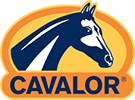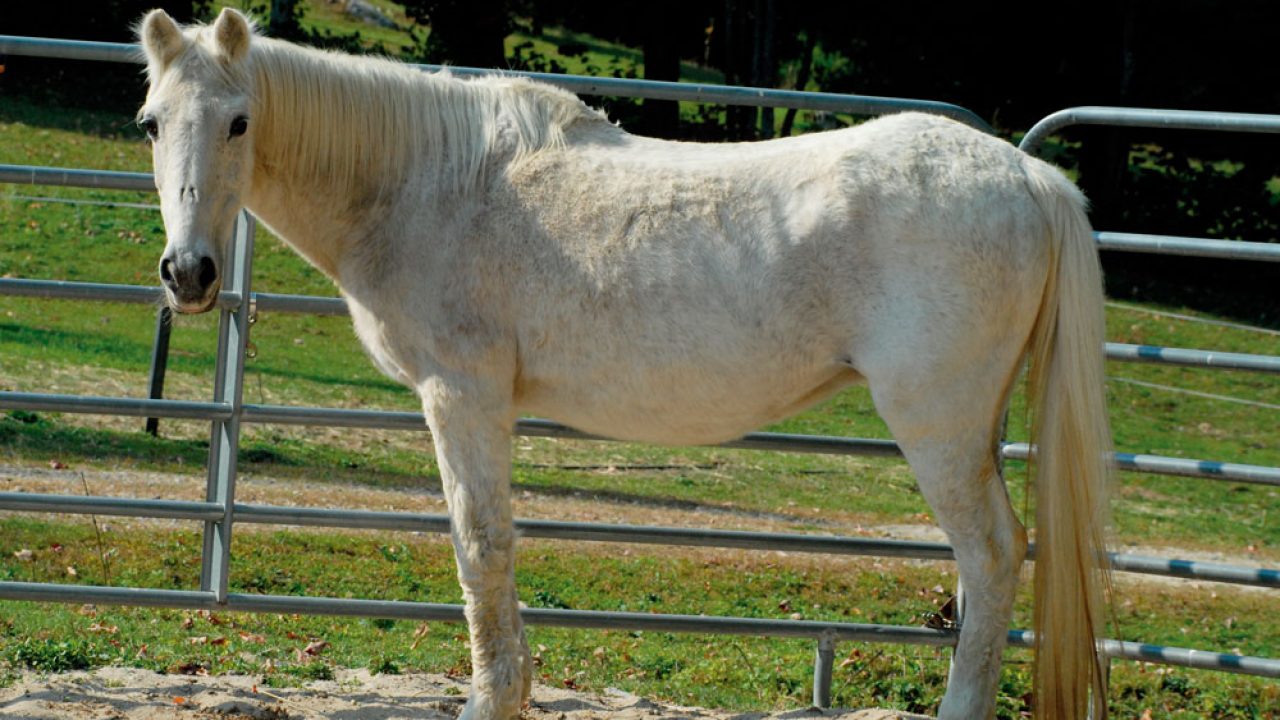Our Cavalor Consumer Line receives many questions about feed every day. The following question often arises: “My horse has Cushing’s disease (or PPID), so he’s extra sensitive to sugars. Nevertheless, he loses weight quickly. What can I feed my horse to keep him in good condition?” In this blog post, our nutritionists share their advice.
Cushing’s disease or PPID (Pituitary Pars Intermedia Dysfunction) is a neurodegenerative disease that affects normal production of hormones such as adrenocorticotropic hormone (ACTH). It mainly occurs in older horses and while there are certain pharmacological treatments to help manage the disease, there is still no real cure to this date. In addition to issues with the pituitary hormones, Cushing’s disease is also often accompanied by abnormal insulin metabolism (insulin dysregulation), which increases the risk for these horses to develop laminitis. Proper dietary management and care of horses with PPID is essential to maintain their health and well-being. We have a number of tips to help you do that.
Choosing the correct dietary regimen based on proper diagnosis
The dietary plan will depend a lot on the horse’s body condition and whether they have been diagnosed with insulin dysregulation. Accurate veterinary diagnosis is recommended. Some PPID horses will be very lean and do not have abnormal insulin metabolism, in which case more calorically dense feeds and pasture are recommended to maintain weight and muscle mass. On the other hand, in case of obesity or insulin dysregulation, diets lower in starch and sugar should be selected to avoid potential laminitis. Close monitoring of body condition/body weight is essential as some PPID horses can quickly lose weight as the disease progresses.
Keep internal systems working properly
A typical symptom of PPID is excessive hair growth and delayed shedding. This can lead to increased heat stress and skin infections, especially during the warm and humid summer months. Proper support of the internal systems can help with these symptoms. We recommend giving Cavalor Hepato Liq at least once but preferably twice a year during shedding seasons to help with haircoat changes. Cavalor Hepato Liq supports the liver and kidney, two organs that play a major role in regulating metabolism. PPID horses also often receive medications and have a tendency to easily lose weight. Supporting the liver and kidneys in their job of breaking down waste products and metabolizing nutrients will help the PPID horse to process medications and obtain more nutrients from the diet to better maintain weight. Administer Hepato Liq twice a day (5cc) for 25 days.
Monitor sugar metabolism
If the PPID horse is diagnosed with insulin dysregulation, Cavalor LaminAid (2 x 25 cc per day) can be really helpful to improve insulin metabolism. A recent scientific study done at the University of Kentucky shows that Cavalor Laminaid has a positive influence on sugar metabolism in horses with insulin dysregulation. The study results show that using Cavalor LaminAid improved insulin sensitivity and reduced the insulin response to an oral glucose challenge. You can learn more about this scientific study here.
Although every horse needs some sugar for healthy metabolism, most of the necessary sugars will be supplied by the forage as this is typically the largest portion of the diet. For PPID horses with insulin problems, we recommend testing the hay for sugar content to avoid excess intake. When selecting a feed for these horses, it is best to pick a concentrate that is lower in starch and sugars. Cavalor FiberForce is a textured feed that provides energy through fat and fiber. It’s very low in sugars and starch, making it the ideal feed for sugar-sensitive horses. Additionally, the long stem fibers and probiotics in Cavalor Fiberforce will stimulate healthy gut and immune function which will greatly help the wellbeing of the PPID horse. For horses weighing 1200 lbs, we recommend a minimum of 6.5 lbs to a maximum of 25 lbs per day. Feed Cavalor FiberForce in small portions throughout the day.
Add extra fat and/or protein to maintain healthy weight and muscle mass
If your horse needs more feed, feed him Cavalor Wholegain, a balancer that ensures safe weight gain by adding fat to the horse’s ration. Cavalor Wholegain is high in fat and contains probiotics and digestive enzymes for optimal digestion and nutrient utilization. For weight gain, we recommend 0.3 lbs per 220 lbs of bodyweight. For horses weighing 1200 lbs that corresponds to approximately 1 lbs of Wholegain per day. Build up gradually over a 5-day period.
Due to abnormal hormone metabolism, PPID horses often not only lose fat but also muscle mass. If you want to rebuild or maintain muscle, we recommend adding extra high quality protein in your horse’s ration. To help with this we recommend Cavalor Vitamino as a follow-up feed once the horse is at good weight after using Cavalor Wholegain. Cavalor VitAmino is a high-quality protein balancer and has been scientifically proven in two recent studies to strongly stimulate muscle protein synthetic pathways. This product can be a valuable addition to the ration of PPID horses to help maintain or promote development of muscle mass. For senior horses, we recommend a minimum of 0.2 lbs and a maximum of 0.45 lbs per 220 lbs of body weight. For horses weighing 1200 lbs, this corresponds approximately to a minimum of 1 lbs and a maximum of 2.5 lbs of Cavalor Vitamino per day.
Prefer to avoid balancers? As an alternative you can add Cavalor OilMega -a supplement rich in omega-3 fatty acids- to their ration. Cavalor OilMega helps your horse gain additional energy from fats, which are a safer source of energy for horses with PPID. Make sure that OilMega is added gradually to your horse’s ration. We recommend the following dosing schedule:
Dose per horse per day:
Day 1: 20 ml
Day 2: 40 ml
Day 3: 60 ml
Day 4: 80 ml
Day 5: 100 ml
After Day 5: 100 ml
Every horse is different, and every horse has different needs. Always feed your horse according to its needs. Cavalor feeds, supplements, and care products help support good health for your horse, from the inside to the outside. If you need specialized feed advice for your horse please visit www.mycavalor.com or call our Consumer Line: (855) 228 2567.


